|
|
|
Sort Order |
|
|
|
Items / Page
|
|
|
|
|
|
|
| Srl | Item |
| 1 |
ID:
169038
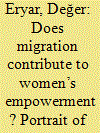

|
|
|
|
|
| Summary/Abstract |
This article empirically investigates the impact of internal migration on women’s empowerment in urban areas of Turkey. Based on data from a nationally representative household survey, we find that migration exerts a positive impact in urban settings through improvements in educational attainment and labor market outcomes. Migration contributes to women’s empowerment by raising their education levels and lowering the gap in schooling between men and women. Migration also allows migrants, both men and women and particularly those with tertiary education, to access jobs and occupations in high wage regions like Istanbul. However, unlike in education, a gender wage gap persists even after migration.
|
|
|
|
|
|
|
|
|
|
|
|
|
|
|
|
| 2 |
ID:
169041
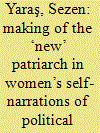

|
|
|
|
|
| Summary/Abstract |
Women’s political empowerment has emerged as a particular field of interest in the late twentieth and early twenty-first centuries in Turkey. Women’s absence in many spheres of life, including the political sphere, has become one of the main references to discuss the patriarchal characteristics of the established regime. The AKP was founded in 2001 by those who claimed to distance themselves from the Islamist Refah Party. The AKP’s particular emphasis on the active roles and status of women within the party and their empowerment as active agents of politics was used as an important mark of distinction from earlier versions of political Islam. In this study, which focuses on the self-narrations of AKP female politicians nominated and elected in the 2009 local elections, the aim is to expand the discussion on how the AKP female representatives narrate their experience of this ‘political empowerment’ stressed in the AKP’s program and whether they subvert, transform or reproduce patriarchal authority.
|
|
|
|
|
|
|
|
|
|
|
|
|
|
|
|
| 3 |
ID:
169042
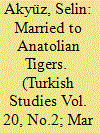

|
|
|
|
|
| Summary/Abstract |
This paper examines business masculinities and relationalities of empowerment in the everyday life experiences of male entrepreneurs and wives of entrepreneurs in three urban centers in Turkey: Gaziantep, Konya and İzmir. We take gendered power inequalities as structural and relational, and empowerment as a complex, multifaceted process. Based on a relational understanding of gender roles, we scrutinize men’s and women’s decision making areas in an attempt to understand normalized and internalized patriarchal values and assumptions, as well as explicit or implicit challenges against such values. We argue that gendered experiences of entrepreneurs and women married to entrepreneurs offer a complementary analysis of nuanced empowerment strategies in the background of seemingly contradictory currents such as economic globalization, transforming masculinities, rising conservatism and reinforced gender hierarchies.
|
|
|
|
|
|
|
|
|
|
|
|
|
|
|
|
| 4 |
ID:
169039


|
|
|
|
|
| Summary/Abstract |
The gender gap in national and local politics is an important problem in numerous countries. Two explanations for the deficit experienced by female politicians relate to demand for women’s representation by political parties and by voters. We argue that the gender gap stems from party-based limitations in local politics. Women do not compete in local politics because relevant parties do not nominate them. We present original data on mayoral candidates who ran in the 2009 and 2014 Turkish local elections. Our findings show that women are less likely to be nominated for office and reasons for this gap originate from party choices rather than lack of electoral support for women.
|
|
|
|
|
|
|
|
|
|
|
|
|
|
|
|
| 5 |
ID:
169037
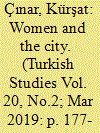

|
|
|
|
|
| Summary/Abstract |
It is vital to understand the structural and institutional dynamics behind female empowerment as its realization benefits not only women but also society at large. Drawing on an original, global-level dataset that covers 169 countries between 1960–2014, this article mainly explores the effect of urbanization on women’s empowerment throughout the world. The article argues that urbanization has distinctive effects in different realms of female empowerment in politics, economics, and education, with the biggest impact being in education. The article further states that urbanization has a non-linear effect on women’s empowerment with a diminishing impact at higher levels of urbanization. After certain levels of urbanization, other political and economic factors, such as how democratic and economically affluent a country is, will determine the discrepancies of female empowerment in countries with similar levels of urbanization. To further test the stated hypotheses, the article looks at the Turkish case as a typical example of a patriarchal society with a neoliberal economic order. In light of the global and local level analyses, the paper aims to contribute to extant debates and studies in feminist studies, urban studies, modernization theory, and democratization.
|
|
|
|
|
|
|
|
|
|
|
|
|
|
|
|
| 6 |
ID:
169040
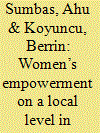

|
|
|
|
|
| Summary/Abstract |
Moving from the assumption that local governments are significant stakeholders of women’s empowerment policies, this article aims to examine the struggle against violence against women (VAW) at the local level through gender-sensitive policies employed by female mayors from a gender perspective and how these can be utilized as collective transformative resources for women’s empowerment. Based on a field-study, the contention of this article is that gender budgeting, gender-sensitive collective-labor contracts, and women’s support centers are institutional resources for the transformation of the municipal-budget, for attitude transformation in male employees, and for sustainable empowerment policies in the struggle against VAW in municipalities in Turkey. This article, stressing the link between the struggle against VAW and women’s empowerment, reveals the significance of institutionalization of gender-sensitive policies and the struggle at local level as two prominent factors taken to be into consideration in women’s empowerment.
|
|
|
|
|
|
|
|
|
|
|
|
|
|
|
|
|
|
|
|
|